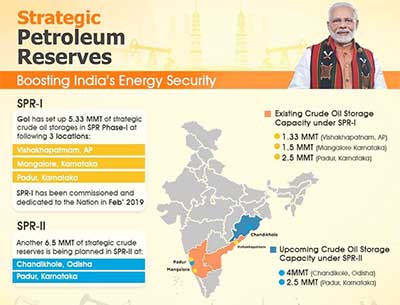GS2: Global groupings and agreements affecting India’s Interests, Effect of policies and politics of developed and developing countries on India’s Interests, important International Fora
GS3: Infrastructure: Energy
Key phrases: OPEC+, Strategic Petroleum Reserves, Crude Oil Imports, Indo-US
Why in News:
India, the world’s third-largest oil importer, has agreed to release 5 million barrels of crude oil from its strategic oil reserves in coordination with other major consumers, including the US, China, Japan and South Korea.
Key points:
- A nearly 60 per cent rise in the price of crude oil in the past year has contributed to fuel rates reaching record highs in India this year.
-
India has repeatedly expressed concern at the supply of oil being artificially adjusted below demand levels by oil-producing countries, leading to rising prices and negative attendant consequences.
- The move sends a clear signal to producing nations about big buyers coming together.
- Organization of the Petroleum Exporting Countries Plus (OPEC+)
-
It is a loosely affiliated entity consisting of the 13 OPEC members and 10 of the world’s major non-OPEC oil-exporting nations.
- OPEC+ aims to regulate the supply of oil in order to set the price on the world market.
- It came into existence, in part, to counteract other nations' capacity to produce oil, which could limit OPEC's ability to control supply and price.
-
They accounts for about 50 per cent of global crude supply
Need for such step:
-
India is heavily dependent on imports to meet 85% of oil demand and 55% of natural gas requirements.
- OPEC accounts for a majority of India’s crude oil imports and around 40% of global production.
- India spent $62.71 billion on crude oil imports in FY21, $101.4 billion in FY20, and $111.9 billion in FY19.
- High oil prices impact raw material costs for businesses and affect competitiveness as some petrochemicals refined from crude oil are the basic building blocks in a host of industries.
-
Besides, higher prices forced the government to cut taxes on petrol and diesel.
Steps Taken:
-
In a bid to control inflationary pressures, the government reduced ‘central excise duty’ on petrol and diesel by ₹5 and ₹10, respectively, on 3 November. It was followed by a reduction in VAT on fuel by many states.
-
India has also been bilaterally raising the issue with major oil-producing countries such as Saudi Arabia, Kuwait, Qatar, the United Arab Emirates, Bahrain and Russia.
- It has made efforts of diversifying sources of crude oil, raising purchases from the US; Supplies from Middle-East nations have fallen in FY21 to 63.5% of India’s total imports from 69% in FY20.
- A strong policy backing is given to facilitate transition from fossil fuel-based transportation to electric mobility.
-
Ethanol blending is critical to reducing dependence on oil. The target is to achieve 20% ethanol blending of petrol by 2025.
- Policy-makers are also eying hydrogen as a fuel.
India’s Strategic Oil Reserves:
- A release of 5 million barrels of crude oil would equate to about 12.8% of India’s strategic oil reserves.
-
India has an existing crude storage capacity of 5.3 million tonnes(mt), including 1.33 mt in Visakhapatnam, 1.5 mt in Mangaluru and 2.5 mt in Padur.
- Built at a cost of $600 million, these reserves are operational and are sufficient to meet around nine-and-a-half days of India’s crude oil requirements.
- India also plans to build an additional 6.5 mt of strategic reserves.
In comparison, International Energy Agency (IEA) members maintain emergency oil reserves equivalent to at least 90 days of net imports. IEA countries hold 1.55 billion barrels of public emergency oil stocks. In addition, 650 million barrels are held by industry under government
Conclusion:
Similar steps could also be taken to temper steel and basic raw material prices at the international level. Such initiatives will ensure that the “transient inflationary impact of rising commodities prices do not turn structural”.
Source: Live mint
Prelims Question:
Q. Consider the following Statements:
-
Strategic Petroleum Reserves (SPR) are aimed for ensuring Energy Security in the Country.
- India has sufficient Oil storage in its SPR to cover its 90 days import needs.
- India has planned to develop over 100 MMT of strategic crude oil storage.
Which of the statement given above is/are correct?
- 1 only
- 2 and 3 only
- 1 and 2 only
- All of the above
Answer: 1 only
Mains Question:
Q. India is heavily dependent on imports to meet its Oil needs. In light of this statement examine the role of Strategic Petroleum Reserves for ensuring India’s Energy Security.







